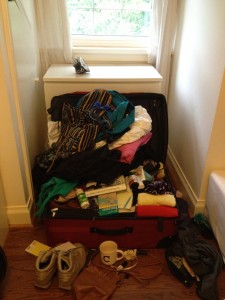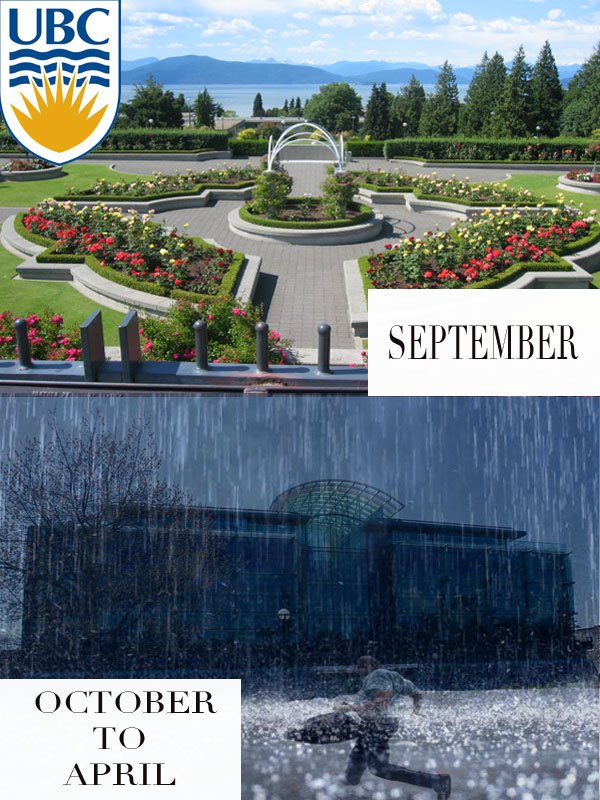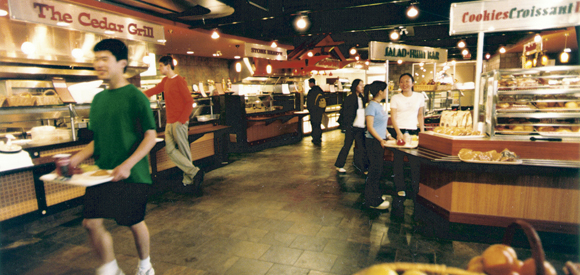We said our farewells to beautiful Nebaj and bussed down, down from the mountains and into the coastal city of Panajachel. This was to be our special weekend break, a couple of days in a tourist city, where we could access the internet whenever we wanted and the pizza and hot showers we so desperately missed. Despite the homey amenities and the abundance of colourful shop stalls, or perhaps because of them, some of us were unhappy with Panajachel. This could have been the curious case of Western tourists seeking the “authentic” in others—“be as you were, pretend we never came!”…but I don’t think that explains it for me. Nebaj was just genuinely more interesting to me than Panajachel in the same way that, in Vancouver, a hiking trail is more interesting to me than a shopping mall. I am all for the success of the locals, but the bright lights at roadside diners made me think of Vegas.
After finishing up and handing in our essays, we ventured out on a daytrip in the heavy rain. We blazed across a lake surrounded by three volcanoes in a sketchy motorboat for twenty.

The first village we visited on the cusp of the lake has a successful history of negotiating a peace treaty with the government before the civil war was officially over, by rallying together as a community after a massacre. But the village is situated in a natural disaster zone. Homes are half-deep in the lake. Hurricanes have passed through, causing mudslides which have destroyed much of the village and the people living in it. Our tour guide was very sceptical of the ability of the government to help, doing more damage than good.
What fascinates me is that, contrary to what anti-immigrationists think, people very rarely just want to migrate. Sure there are a few wandering souls, but most have a deep connection to the land they grew up in. They will refuse to leave even when they are in a natural disaster zone, even when there is war. It is only when things really get unbearable, when they need to leave, that they migrate. At least, for natives.
The sun broke out at some point, and I experienced an epic ride on the back of a truck along a coastal road. I felt like the happiest dog in the world. Below that, is a great photo of my philosophy professor.


We also met with a women’s weaving co-operative . They work only with natural dyes, relearning and sometimes reinventing traditional native knowledges of dyeing. I think our professors have a selective bias of scheduling visits to co-operatives and villages with inspiring grassroots development stories. It could lead one to mistakenly think that all of Guatemala is like this. No, I think, it is meant to be a hope. It makes me wonder, what co-operatives exist in Canada? Do they work as a model for profitable enterprises?


Anyway, we had Aly take some clothes to the laundromat while she was deathly ill (OK, that makes us sound like horrible people but I swear she offered while we were out on the daytrip) and we laughed ourselves to sleep by watching Spanish dubbed Twilight on our hotel T.V. I am hard pressed to believe that that stuff is not meant to be comedy.
Now for the big move. We were about to spend two and a half weeks at this mysterious “coffee co-operative” we kept on hearing so much about: “Nueva Alianza”, an hour drive from the town of Retalhuleu. It was humid and hot as we drove past new sights: coffee trees, bamboo, and tropical things, down what must be at least a one hundred year old cobble-stone road (which I swear, if were paved, would take a quarter of the time to traverse). The day passed quickly as we lugged our bags into rooms of four to six in a farm-like motel, and I nearly fell asleep during our welcoming/the let-me-tell-you-our-organizations’-entire-history speech, much to the chagrin of my professors.


But seriously, the history of the group is really something. The other students can probably recall it better, but the group is basically a co-operative of local workers who were totally screwed over to starving point by a bankrupt owner. They took over the farm for themselves, fought a legal battle, took out a loan, and are paying it back with the help of the eco-tourist hotel we were staying in. We watched a documentary some tourists made about the history of the co-op and I was really interested to hear these self-proclaimed “peasants” use the hefty language of “rights.” I want to know where that discourse of rights comes from, and I have a sneaking suspicion it does not come from international human rights regimes…but who knows?
The basic setup was this, then: wake up at 6 a.m. by either Sara or the sound of the cooks preparing breakfast on a biofuel stove. Take a “military shower” i.e. starting the freezing cold water on and off again as you bathe. Yes, it does reduce the number of showers one chooses to take, since you asked. Then, chill out on one of the hammocks in the deck/main-room until breakfast. Help set up the table. Eat food impressively prepared without a refrigerator at the long-table with everyone; the food was decent and homey but I was very whiny about the runny bean and eggs breakfast by the end. Help clean up the table. Visit the store located in the neighbour’s home for some absolutely necessary cookies, or in Aly’s case, macadamia nuts. Go swim in a waterfall if you’re not Miriam, chase chickens if you’re mean, and laugh. Do your readings for class, in your bunkbed or in the media room or the roof overlooking the volcano studded tropical rainforest.


Carbohydrate-stuffed lunch—pass over the evil corn tortillas every single time. Then participate in a three hour class at the long-table. Commence, at mid-afternoon, a tropical thunderstorm with crackling lightning and massive thunder, forcing the professor to shout. After class, fiddle around on a guitar, watch Kevin (practically the only male in the town we ever saw) chop wood or gather fresh coconuts for us, and then go to dinner. Do homework. Hang out around a bonfire. Start a secret civil association with your roommates that has its own made-up religion/s, and conspire against the world. Do more homework by candlelight or with your flashlight on. Tuck your ironically pink bednet around the bedpost sometime after 10 p.m. Cue falling fast asleep.

So the courses really took off those two and a half weeks in the coffee co-op. I will write about them in my summer course review, but let’s just say that I ended up really enjoying my philosophy class. I was especially interested by the section on theories of global justice. My mind opened the primly shut national cage and welcomed in the 7 billion who are just as in need of justice as anyone in Canada. It seems like a relatively new field of thought in philosophy and it has had a great impact on me now that I am back in Vancouver—this is a story for another blogpost! The sociology course was…new. Never had I taken a sociology course, and while I enjoyed most of the readings, I wasn’t sure what was expected of me or what we were trying to do. Both professors were fabulous people though and I enjoyed seeing them enjoy their time in Guatemala like, you know, human beings.
I read Tolstoy’s Anna Karenina after I came back from Guatemala and I really sympathized with the spiritual crisis the character, Levin, was going through. When I was on the roof of Nueva Alianza, I would look out at the big leafy trees and the neighbour’s house spilling out with brown-skinned children. 7 billion…I cannot fathom, I even despise, the idea that we are fully fleshed memory-bots and that life is a series of memories, or experiences, or a bucket list. Was my visiting Guatemala on this roof going to be just another memory to be forgotten when I’m dead? Why care so much? What is this befuddling thing called consciousness? I am sorry to say that I do not have an answer.
Time for lightheartedness. Bugs–we were, after all, in the middle of a tropical rainforest. While we passed through the initial phase of attempting to pre-emptively kill them all (by the end: a fly in your cup of tea? Just spoon it out), everyone still had a very unsolicited bug encounter story. Cockroaches jumping in your bed, giant beetles the size of your palm whirring with a mechanical-sounding buzz, centipedes in the shower, and suicidal moths that would spiral down madly from the ceiling at night. I recall one particular study session in the evening on the deck. I was in the middle of summarizing Marcuse when a moth decided to commit suicide from the ceiling by burrowing into my blouse. Worst of all was the night of hell.

I woke up after midnight to the dreaded sound of a buzzing giant beetle…you wouldn’t guess where it was coming from: inside my bednet. I frantically jumped out of bed and inadvertently woke up Sara. Before I could address the very pressing issue of the giant beetle, a yellow moth literally began chasing me around the room. I apologize to everyone for the screaming, but then again, I don’t, because it was horrific. The moth managed to successfully cling onto my back twice—Sara had to bravely slap away at it from her top bunk. All the while, the giant beetle buzzed and whirred and I was panicking about the noise I heard from the bathroom nearby—the garbage can was knocked over by a stray dog again—what if it traipsed into the room while all this was happening!? In the mad hustle and bustle, Anna heard us from outside, walked in, and saved us all. She narrowly kept another moth from coming in, this time the size of a bird, and she dealt with my bugs. And in fact, pretty much every bug we encountered in our room. Now that I’m back in Vancouver, I scoff when people point out a tiny spider or a harmless moth. I am a battle-hardened veteran.
The tale of the gecko, next week. And more about living in a small motel with twenty other people. And becoming really ill.
Weblink to the UBC Go Global Group Study Programs.



























